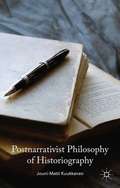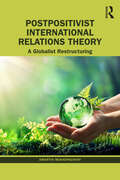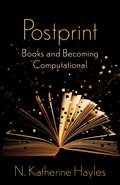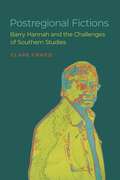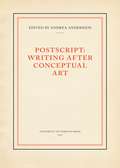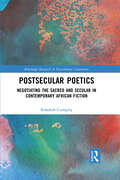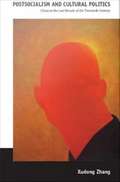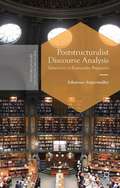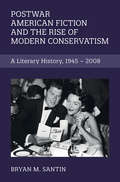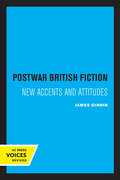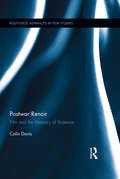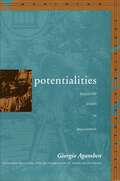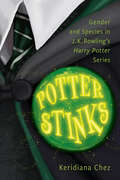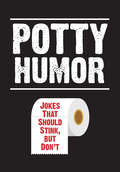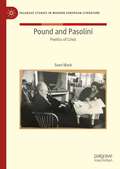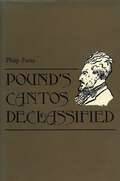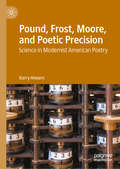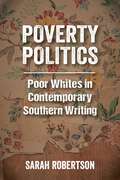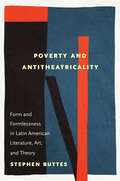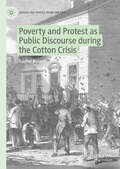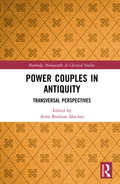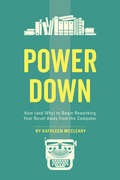- Table View
- List View
Postnarrativist Philosophy of Historiography
by Jouni-Matti KuukkanenPostnarrativist Philosophy of Historiography argues that narrativism has made important contributions to the theory and philosophy of historiography but that it is now time to move beyond it to postnarrativism. Much of the theorizing of historiography has focused on defending either absolutist historical realism or relativist postmodernism. Kuukkanen shows how it is possible to reject the truth-functional evaluation of interpretations and yet accept that historiography can be assessed by rational standards. The postnarrativist view maintains that studies of history are informal arguments for theses about the past and that they are always located somewhere between subjectivity and objectivity.
Postpositivist International Relations Theory: A Globalist Restructuring
by Amartya MukhopadhyayThis book discusses postpositivist theories foregrounding postpositivism against the reigning realist and positivist-pluralist orthodoxies. The book explicates seven theories, not as disparate endeavours, but as developments linked by a common thread that seeks to enunciate globalist emancipatory goals for the theoretical field and the world that these theories seek to change. It focuses on the following themes: feminism, environmentalism or green theory, the English school, critical theory, constructivism, postmodernism and postcolonialism. Additionally, a separate chapter on globalization shows that while mainstream (neo)realist international relations theories respond hostilely to globalization and liberal-pluralist theories react benignly to it, postpositivist theories positively welcome it. The book offers a competent meta-theoretical gridwork, showing on which side of the opposing disciplinary positions in the fourth debate each of the seven theories are located. It is a comprehensive guide to the postpositivist restructuring of the discipline of international relations. This book will be of interest to researchers and students of political science, international relations, history, humanities and literature.
Postprint: Books and Becoming Computational (The Wellek Library Lectures #109)
by N. Katherine HaylesSince Gutenberg’s time, every aspect of print has gradually changed. But the advent of computational media has exponentially increased the pace, transforming how books are composed, designed, edited, typeset, distributed, sold, and read. N. Katherine Hayles traces the emergence of what she identifies as the postprint condition, exploring how the interweaving of print and digital technologies has changed not only books but also language, authorship, and what it means to be human.Hayles considers the ways in which print has been enmeshed in literate societies and how these are changing as some of the cognitive tasks once performed exclusively by humans are now carried out by computational media. Interpretations and meaning-making practices circulate through transindividual collectivities created by interconnections between humans and computational media, which Hayles calls cognitive assemblages. Her theoretical framework conceptualizes innovations in print technology as redistributions of cognitive capabilities between humans and machines. Humanity is becoming computational, just as computational systems are edging toward processes once thought of as distinctively human. Books in all their diversity are also in the process of becoming computational, representing a crucial site of ongoing cognitive transformations.Hayles details the consequences for the humanities through interviews with scholars and university press professionals and considers the cultural implications in readings of two novels, The Silent History and The Word Exchange, that explore the postprint condition. Spanning fields including book studies, cultural theory, and media archeology, Postprint is a strikingly original consideration of the role of computational media in the ongoing evolution of humanity.
Postregional Fictions: Barry Hannah and the Challenges of Southern Studies (Southern Literary Studies)
by Clare ChaddDrawing from recent debates about the validity of regional studies and skepticism surrounding the efficacy of the concept of authenticity, Clare Chadd’s Postregional Fictions focuses on questions of southern regional authenticity in fiction published by Barry Hannah from 1972 to 2001. The first monograph on the Mississippi author’s work to appear since his death, this study considers the ways in which Hannah’s novels and short stories challenge established conceptual understandings of the U.S. South. Hannah’s writing often features elements of metafiction, through which the putative sense of “southernness” his stories dramatize is complicated by an intense self-reflexivity about the extent to which a sense of place has never been foundational or essential but has always been constructed and performed. Such texts locate a productive terrain between the local and the global, with particular relevance for critical apprehensions of the post-South and postsouthern literature. Offering sustained close readings of selected stories, and focusing especially on Hannah’s late work, Chadd argues that his fiction reveals the region constantly shifting in a process of mythmaking, dialogue, and performance. In turn, she uses Hannah’s work to suggest how notions of the “South” and “southernness” might survive the various deconstructive approaches leveled against them in recent decades of southern studies scholarship. Rather than seeing an impasse between the regional and the global, Chadd’s reading of Hannah shows the two existing and flourishing in tandem.In Postregional Fictions, Chadd offers a new interpretation of Hannah based on an appreciation of the vital intersection of southern and postmodern elements in his work.
Postscript: Writing After Conceptual Art
by Andrea AnderssonPostscript is the first collection of writings on the subject of conceptual writing by a diverse field of scholars in the realms of art, literature, media, as well as the artists themselves. Using new and old technology, and textual and visual modes including appropriation, transcription, translation, redaction, and repetition, the contributors actively challenge the existing scholarship on conceptual art. Rather than segregating the work of visual artists from that of writers we are shown the ways in which conceptual art is, and remains, a mutually supportive interaction between the arts.
Postsecular Poetics: Negotiating the Sacred and Secular in Contemporary African Fiction (Routledge Research in Postcolonial Literatures)
by Rebekah CumpstyThis book is the first full-length study of the postsecular in African literatures. Religion, secularism, and the intricate negotiations between the two, codified in recent criticism as postsecularism, are fundamental conditions of globalized modernity. These concerns have been addressed in social science disciplines, but they have largely been neglected in postcolonial and literary studies. To remedy this oversight, this monograph draws together four areas of study: it brings debates in religious and postsecular studies to bear on African literatures and postcolonial studies. The focus of this interdisciplinary study is to understand how postsecular negotiations manifest in postcolonial African settings and how they are represented and registered in fiction. Through this focus, this book reveals how African and African-diasporic authors radically disrupt the epistemological and ontological modalities of globalized literary production, often characterized as secular, and imagine alternatives which incorporate the sacred into a postsecular world.
Postsocialism and Cultural Politics: China in the Last Decade of the Twentieth Century
by Xudong ZhangIn Postsocialism and Cultural Politics, Xudong Zhang offers a critical analysis of China's "long 1990s," the tumultuous years between the 1989 Tiananmen Square crackdown and China's entry into the World Trade Organization in 2001. The 1990s were marked by Deng Xiaoping's market-oriented reforms, the Taiwan missile crisis, the Asian financial crisis, and the end of British colonial rule of Hong Kong. Considering developments including the state's cultivation of a market economy, the aggressive neoliberalism that accompanied that effort, the rise of a middle class and a consumer culture, and China's entry into the world economy, Zhang argues that Chinese socialism is not over. Rather it survives as postsocialism, which is articulated through the discourses of postmodernism and nationalism and through the co-existence of multiple modes of production and socio-cultural norms. Highlighting China's uniqueness, as well as the implications of its recent experiences for the wider world, Zhang suggests that Chinese postsocialism illuminates previously obscure aspects of the global shift from modernity to postmodernity. Zhang examines the reactions of intellectuals, authors, and filmmakers to the cultural and political conflicts in China during the 1990s. He offers a nuanced assessment of the changing divisions and allegiances within the intellectual landscape, and he analyzes the postsocialist realism of the era through readings of Mo Yan's fiction and the films of Zhang Yimou. With Postsocialism and Cultural Politics, Zhang applies the same keen insight to China's long 1990s that he brought to bear on the 1980s in Chinese Modernism in the Era of Reforms.
Poststructuralist Discourse Analysis
by Johannes AngermullerThis book presents developments of discourse analysis in France and applies its tools to key texts from five theorists of structuralism: Lacan, Althusser, Foucault, Derrida and Sollers. It pays special attention to enunciative pragmatics as a poststructuralist approach which analyzes the discursive construction of subjectivity.
Postwar American Fiction and the Rise of Modern Conservatism: A Literary History, 1945–2008 (Cambridge Studies in American Literature and Culture #186)
by Bryan M. SantinBryan M. Santin examines over a half-century of intersection between American fiction and postwar conservatism. He traces the shifting racial politics of movement conservatism to argue that contemporary perceptions of literary form and aesthetic value are intrinsically connected to the rise of the American Right. Instead of casting postwar conservatives as cynical hustlers or ideological fanatics, Santin shows how the long-term rhetorical shift in conservative notions of literary value and prestige reveal an aesthetic antinomy between high culture and low culture. This shift, he argues, registered and mediated the deeper foundational antinomy structuring postwar conservatism itself: the stable social order of traditionalism and the creative destruction of free-market capitalism. Postwar conservatives produced, in effect, an ambivalent double register in the discourse of conservative literary taste that sought to celebrate neo-aristocratic manifestations of cultural capital while condemning newer, more progressive manifestations revolving around racial and ethnic diversity.
Postwar British Fiction: New Accents and Attitudes
by James GindinThis title is part of UC Press's Voices Revived program, which commemorates University of California Press’s mission to seek out and cultivate the brightest minds and give them voice, reach, and impact. Drawing on a backlist dating to 1893, Voices Revived makes high-quality, peer-reviewed scholarship accessible once again using print-on-demand technology. This title was originally published in 1962.
Postwar Renoir: Film and the Memory of Violence (Routledge Advances in Film Studies)
by Colin DavisThis book re-assesses director Jean Renoir’s work between his departure from France in 1940 and his death in 1979, and contributes to the debate over how the medium of film registers the impact of trauma. The 1930s ended in catastrophe for both for Renoir and for France: La Règle du jeu was a critical and commercial disaster on its release in July 1939 and in 1940 France was occupied by Germany. Even so, Renoir continued to innovate and experiment with his post-war work, yet the thirteen films he made between 1941 and 1969, constituting nearly half of his work in sound cinema, have been sorely neglected in the study of his work. With detailed readings of the these films and four novels produced by Renoir in his last four decades, Davis explores the direct and indirect ways in which film, and Renoir’s films in particular, depict the aftermath of violence.
Pot Shots at Poetry
by Robert Francis(back cover full description) Poets often get away with murder, and not only in their poems. Take, for instance, their behavior on the platform and in the classroom, their uncritical critical clichés, their absurd claims to importance. Take the poet who having just received a grant can now "go to work" on a book of poems. Above all, consider that toplofty fiction, THE POET, the Poet with the capital P, the Poet on the Pedestal, the Poet who is the noblest work of God. No matter how freely and ferociously poets poke fun at one another, sometimes trying to annihilate one another, they all bow down to the Poet with the capital P. Never before have so many absurdities in the poetic world been pinpointed and pinpricked.
Potentialities: Collected Essays in Philosophy (Meridian: Crossing Aesthetics)
by Giorgio AgambenThis book collects fifteen major philosophical essays spanning more than twenty years by acclaimed Italian philosopher and author of State of Exception.Giorgio Agamben is one of contemporary philosophy’s most influential thinkers on the subjects of language, power, society. This collection of essays opens with an enlightening introduction by the translator Daniel Heller-Roazen, who situates Agamben’s work with respect to both the history of philosophy and contemporary European thought. The essays that follow articulate a series of theoretical confrontations with privileged figures in the history of philosophy, politics, and criticism, from Plato to Spinoza, Aristotle to Deleuze, Carl Schmitt to Benjamin, Hegel to Aby Warburg, and Heidegger to Derrida. Three fundamental concepts organize the collection as a whole: the existence of language; the nature of history; and the problem of potentiality in metaphysics, ethics, and the philosophy of language. All these topics converge in the final part of the book, in which Agamben offers an extensive reading of Melville’s short story “Bartleby the Scrivener” as a work that puts potentiality and actuality, possibility and reality, in a new light.
Pothu Tamizh (Tamil Reader) 11th Standard - Tamilnadu Board
by Training State Council of Educational ResearchPothu Tamizh (Tamil Reader) Textbook for the 11th Standard Students, preparing for Tamil Nadu State Board Exam.
Potter Stinks: Gender and Species in J. K. Rowling’s Harry Potter Series
by Keridiana ChezDecades after captivating the globe with the Harry Potter series, J. K. Rowling ignited fierce controversy by promoting anti-trans views through social media and her website. The ensuing debate prompted a re-reckoning of the series’s latent conservatism as devoted fans grappled with its lionized author’s online vitriol against a vulnerable group. In the wake of this controversy, Potter Stinks: Gender and Species in J. K. Rowling’s "Harry Potter" Series critically examines the limitations of the liberalism embedded within the series. At the same time, the book highlights what remains worthy of celebration and rekindles important conversations about the intersection of literature, ideology, and social change. Looking primarily at the original seven books, author Keridiana Chez discusses how gender and species discourses operate in wizarding society, intersecting with questions of class, technology, and labor as well as gender and species fluidity and trans identities. Potter Stinks serves as a vital contribution to Harry Potter scholarship, paving the way for a more nuanced understanding of one of the most influential literary franchises of our time.
Potty Humor: Jokes That Should Stink, But Don't
by Brian BooneGet ready for the hundreds of gross-out groaners to be found on the pages of Potty Humor! From the folks who brought you Dad Jokes and Dad Jokes Too, here&’s an entire book devoted to pee jokes, poop jokes, barf jokes, and more. This volume of icky humor will have your friends and family cringing and moaning all year long!
Pound and Pasolini: Poetics of Crisis (Palgrave Studies in Modern European Literature)
by Sean MarkIn October 1967, Pier Paolo Pasolini travelled to Venice to interview Ezra Pound for broadcast on national television. One a lifelong Marxist, the other a former propagandist for the Fascist regime, their encounter was billed as a clash of opposites. But what do these poets share? And what can they tell us about the poetics and politics of the twentieth century? This book reads one by way of the other, aligning their engagement with different temporalities and traditions, polities and geographies, languages and forms, evoked as utopian alternatives to the cultural and political crises of capitalist modernity. Part literary history, part comparative study, it offers a new and provocative perspective on these poets and the critical debates around them – in particular, on Pound’s Italian years and Pasolini’s use of Pound in his work. Their connection helps to understand the implications and legacies of their work today.
Pound's Cantos Declassified
by Philip FuriaBy using his Cantos for storing, "making new," and transmitting historical documents, Pound was returning the epic to its ancient function as a tribal archive for the "luminous details" of history that define a culture's past and shape its future. So argues this book, which does not overlook the poem's brilliant lyrical passages but for the first time focuses on those vast stretches of Pound's epic composed not of literary touchstones but of that most unpoetic of literary forms, historical documents.Pound's task as epic poet was complicated by the fact that the documents he wished to renew and transmit to his culture were largely unknown, often because in his mind they had been suppressed by a widespread conspiracy throughout the ages which he termed the "historical black-out." His Cantos therefore, he believed, must be a counter-conspiracy to rescue vital documents from that black-out, renew them, and then recirculate them to combat the economic and political forces behind the black-out.Drawing on recent research by numerous scholars, Furia traces the arcane documents Pound unearthed from libraries around the world and shows how he transmuted this documentary mass into poetry, first by framing passages of prose to highlight their poetic texture and then by weaving these shards and fragments into a collage of intricate structure. Among the documents Furia "declassifies" are Chinese edicts, Italian bank charters, British factory commission reports, Byzantine guild regulations, American Presidential papers, municipal records, judicial writs, parliamentary statutes, legislative codes, contracts, deeds, mandates, treaties, diary entries, and correspondence by such diverse figures as Lorenzo de' Medici, Martin Van Buren, Napoleon, Eleanor of Aquitaine, Mustapha Kemal, and Kubla Khan.Pound's Cantos Declassified traces the poet's struggle to shape the content of the epic poem that absorbed most of his creative life.
Pound, Frost, Moore, and Poetic Precision: Science in Modernist American Poetry
by Barry AhearnPound, Frost, Moore and Poetic Precision: Science in American Modernist Poetry examines three major poets in light of the demand that poetry aspire to scientific precision. The critical insistence that poetry be precise affected every one of these poets, and looking at how they responded to this insistence offers a new perspective on their achievements and, by extension, twentieth-century poetry in general. Ezra Pound sought to associate poetry with the precision of modern science, technology and mathematics as a way to eliminate or reduce error. Robert Frost, however, welcomed imprecision as a fundamental aspect of existence that the poet could use. Marianne Moore appreciated the value of both precision and imprecision, especially with respect to her religious perspective on human and natural phenomena. By analyzing these particular poets’ reaction to the value placed on precision, Barry Ahearn explores how that emphasis influenced the broader culture, literary culture and twentieth-century Modernist American poetry.
Poverty Politics: Poor Whites in Contemporary Southern Writing
by Sarah RobertsonRepresentations of southern poor whites have long shifted between romanticization and demonization. At worst, poor southern whites are aligned with racism, bigotry, and right-wing extremism, and, at best, regarded as the passive victims of wider, socioeconomic policies. In Poverty Politics: Poor Whites in Contemporary Southern Writing, author Sarah Robertson pushes beyond these stereotypes and explores the impact of neoliberalism and welfare reform on depictions of poverty. Robertson examines representations of southern poor whites across various types of literature, including travel writing, photo-narratives, life-writing, and eco-literature, and reveals a common interest in communitarianism that crosses the boundaries of the US South and regionalism, moving past ideas about the culture of poverty to examine the economics of poverty. Included are critical examinations of the writings of southern writers such as Dorothy Allison, Rick Bragg, Barbara Kingsolver, Tim McLaurin, Toni Morrison, and Ann Pancake. Poverty Politics includes critical engagement with identity politics as well as reflections on issues including Hurricane Katrina, the 2008 financial crisis, and mountaintop removal. Robertson interrogates the presumed opposition between the Global North and the Global South and engages with microregions through case studies on Appalachian photo-narratives and eco-literature. Importantly, she focuses not merely on representations of southern poor whites, but also on writing that calls for alternative ways of reconceptualizing not just the poor, but societal measures of time, value, and worth.
Poverty and Antitheatricality: Form and Formlessness in Latin American Literature, Art, and Theory
by Stephen ButtesPoverty and Antitheatricality argues that many major analytical approaches today misunderstand the problem of poverty by emphasizing its status as an experience. These experiential models transform poverty from a specific socioeconomic status lived in a particular historical sequence into a transhistorical presence of marginality that is not only inevitable but necessary. Embedded in capitalist, socialist, and populist forms of socioeconomic organization, these models paradoxically suggest that if we want to have a world free of poverty, we must always have the poor and their experience of formlessness. Taking up the paired terms—form and formlessness—Stephen Buttes demonstrates how they sustain not only debates about poverty and its political role within modernity but also the idea of the work of art within the history of modernism. Offering critiques of critical theory alongside new readings of both canonical and little-studied Latin American authors and artists, Poverty and Antitheatricality makes a compelling case that understanding the kind of problem the work of art is opens up overlooked but essential pathways to understanding poverty and the kind of problem it is.
Poverty and Protest as Public Discourse during the Cotton Crisis (Neglected Voices from the Past)
by Rachel BroadyThis book constitutes the first book-length study of journalistic responses to poverty and protest during the Lancashire cotton crisis. The cotton crisis of 1861-1865 is a popular subject in history, culture and education. Workers’ voices are comprehensively studied in terms of newspapers publishing fiction and poetry, and the broader political response to the crisis, the American Civil War and British workers’ support of Lincoln’s Emancipation Proclamation. They are, though, overlooked in terms of journalistic representation of workers. Ironically, discussions of the cotton crisis, including where efforts are made to assess the workers’ experience, have consistently relied upon journalism as primary sources and the first witness of history without assessing the news copy’s political unconscious. This lack of attention is especially apparent when considering workers challenging poverty through dedicated protest. Amid the celebrated workers’ opposition to slavery, and their ‘sublime heroism’ as noted by American President Abraham Lincoln, there were less studied local struggles for financial help, for education, and for the vote.
Poverty in Contemporary Literature: Themes and Figurations on the British Book Market
by Barbara KortePoverty and inequality have gained a new public presence in the United Kingdom. Literature, and particularly narrative literature, (re-)configures how people think, feel and behave in relation to poverty. This makes the analysis of poverty-themed fiction an important aspect in the new transdisciplinary field of poverty studies.
Power Couples in Antiquity: Transversal Perspectives (Routledge Monographs in Classical Studies)
by Anne Bielman SánchezEveryone can name a couple made up of famous, rich, or powerful partners, who cultivate a joint media image which is stronger than either of their individual identities. Since the 1980s they have been known as "power couples". Yet while the term is recent, the concept is not. More than 2,000 years ago, Greeks and Romans became aware of the media potential of couples and used it as an instrument to reinforce political power. Notable examples are Philip II of Macedonia and Olympias, Cleopatra and Mark Antony, or the Emperor Augustus and his wife Livia. <P><P>Power Couples in Antiquity brings together the reflections of ten specialists on Greek and Roman power couples from the fourth century BCE to the first century CE. It is focused on the birth and the development of the "ruling couple" in the Hellenistic Greek kingdoms and in Rome between the end of the Republic and the beginning of the Empire. By taking some emblematic cases, this book analyses the redistribution of public and private roles within these couples, examines the sentimental bonds or the relations of domination established between partners, explores how these relationships played out in private, and highlights the many common points between ancient and contemporary power couples. This book offers a fascinating insight into power dynamics in the ancient world, exploring not only the subtleties within these often complex relationships, but also their relationships with their subjects through the cultivation and manipulation of their joint public image.
Power Down: How (and Why) to Begin Reworking Your Novel Away from the Computer
by Kathleen McclearyWhen you're ready to revise your novel, move away from the computer screen and take a hands-on approach. In "Power Down," Kathleen McCleary offers techniques, tools, and tips for revising away from the computer. This exclusive e-book offers a fresh perspective for your work-in-progress and teaches you how to focus your attention more fully at this critical stage. Kathleen McCleary is the author of three novels: House and Home (2008); A Simple Thing (2012), nominated for the Library of Virginia Literary Award in fiction; and Leaving Haven (2013), a Target Emerging Author pick. Her nonfiction articles have appeared in Parade magazine, The New York Times, The Washington Post, Good Housekeeping, and many other publications. She has taught writing as an adjunct professor at American University and is an instructor with Writopia Labs, a nonprofit that teaches creative writing to kids. Learn more about Kathleen on her website: www.kathleenmccleary.com.
